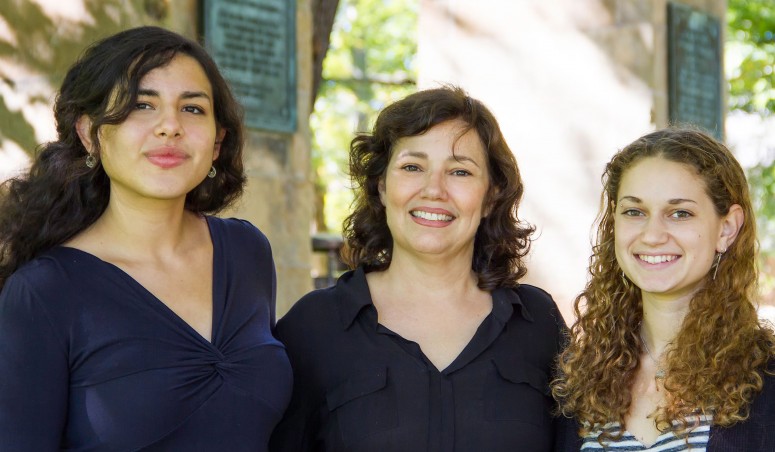Documenting Culture

From Kenyon News - November 30, 2015
An exhibit by Professor of Spanish Clara Román-Odio and two student researchers featuring photos, stories and video interviews about Latinos who live in Knox County will open Dec. 1 in Olin Library.
The project called Latinos in Rural America required hundreds of hours of research and interviews by Román-Odio and two fluent Spanish majors in the Latino/a Studies concentration, Patricia Mota ’16 and Amelia Dunnell ’17.
The exhibit featuring colorful, bilingual banners with photos by Mota of area residents will be on display through Dec. 18 in the Presidential Lobby during regular library hours. The campus is invited to an opening reception from 4:30 to 7:30 p.m. Dec. 1, when Fiesta Mexicana restaurant from nearby Mount Vernon will serve authentic food, such as guacamole and salsa.
Román-Odio, director of the Latino Studies program, received a $17,000 grant for the project from the Columbus, Ohio-based nonprofit organization Ohio Humanities. She wanted to chronicle the lives of Latinos who have been recorded as residing in Knox County since the beginning of the last century.
A demographic database shows 789 Hispanic people lived in Knox County in 2013, which is about 1.3 percent of the population, she said. While small, that amount doubled in the preceding decade, and the growth likely will continue, she said.
People who visit the exhibit will come away with a better understanding of the meaningful contributions Latinos make to the community, said Román-Odio, the faculty leader of Kenyon’s community-engaged learning initiative, working with the new Office for Community Partnerships. “Latinos are part of the diversity of the fabric of this place,” she said. “I invite the community to come. I feel like they will be surprised and enriched by the information.”
Mota and Dunnell helped record interviews with about 15 people, touching on journey stories, family life, food traditions, church involvement and perceptions of inclusion.
Mota, of Chicago, who has a second major in international studies, received funding as an emerging humanities scholar through the Ohio Humanities grant. She expects to pursue a teaching career because of the project that she said was transformational and incited in her a belief that education can be a force in a community. “Now I see teaching as a platform to community-engaged learning and how powerful that can be, bringing what you learn in the classroom and extending it out,” she said. “It’s made my goodbye to Kenyon a much more powerful goodbye.”
Dunnell, of Montclair, New Jersey, received a Kenyon Summer Scholars stipend for the research and said she wants a career that contributes to equality for Latino people. “I think this project reaffirmed that I don’t want to end up in a job where I’m removed from the lived realities of the experience, and I want to make sure that whatever I’m doing is having a tangible effect,” she said.
The research resulted in two other community-engaged learning projects developed by students in one of Román-Odio's Spanish classes: a pamphlet to serve as a primer on cross-cultural interactions and a class at the Salvation Army in Mount Vernon to help area Latino youths prepare for college.
The flier about Latino culture, values and communication norms will be distributed at the county Health Department, in schools and at social service organizations. At the college-prep class requested by parents, Kenyon students help high school and middle school students learn the application process, research potential schools and study for the SAT and ACT.
After the showing at Kenyon, the display will move to the Mount Vernon Library in January, Ohio State University in February and Miami University in southwest Ohio in March. The research eventually will be displayed permanently online through Digital Kenyon, a repository for the College’s scholarly work.
This program is made possible in part by Ohio Humanities, a state affiliate of the National Endowment for the Humanities. Any views, finding conclusions or recommendations expressed in this exhibition do not necessarily reflect those of the National Endowment for the Humanities.